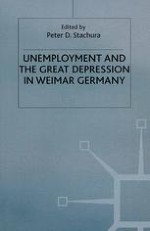1986 | OriginalPaper | Buchkapitel
Physicians in Crisis at the End of the Weimar Republic
verfasst von : Michael H. Kater
Erschienen in: Unemployment and the Great Depression in Weimar Germany
Verlag: Palgrave Macmillan UK
Enthalten in: Professional Book Archive
Aktivieren Sie unsere intelligente Suche, um passende Fachinhalte oder Patente zu finden.
Wählen Sie Textabschnitte aus um mit Künstlicher Intelligenz passenden Patente zu finden. powered by
Markieren Sie Textabschnitte, um KI-gestützt weitere passende Inhalte zu finden. powered by
The Weimar Republic was not a particularly happy time for German doctors of medicine. Having hardly evolved into a fully-fledged profession when the First World War began, they found themselves in great demand during that conflict, only to be somewhat abandoned by society after their return to civilian life. One problem was that there were now too many doctors in the land, and the young among them were pushing the older ones to retire and make room for them. On the other side, the established doctors resented the large medical student numbers and squarely opposed female students and practitioners, now ever more visible. Because the physician-patient ratio was changing, the doctors’ earnings were not what they used to be. In addition, the physicians continued, in many important respects, to suffer from a dependence on the sickness insurance funds, to a degree which outside observers regarded as detrimental to the doctors’ interests. Physicians found it difficult to solve all these problems on their own, especially as they considered the sociopolitical climate of Weimar a hostile one. It is not surprising, then, that many of them crossed over to the National Socialists before the Republic had spent itself. What is less certain, to date, is how large exactly this group was, how old its members were, what their detailed expectations consisted of and how they thought the Nazis had fulfilled them after the erection of the Third Reich.
